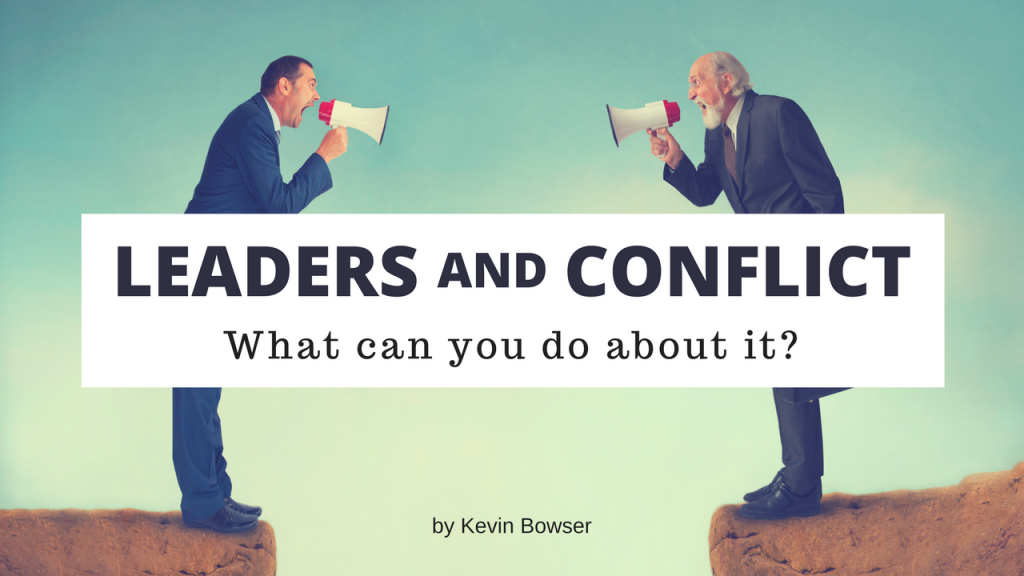I have been thinking a lot lately about conflict and conflict resolution. I think we can all agree that some level of conflict is unavoidable. However, how we face it and whether or not we resolve that conflict says a great deal about our own leadership styles and abilities.
Consider the following statement by Warren Bennis, one of the foremost writers on leadership and organizational and management theory.
“Leaders do not avoid, repress, or deny conflict, but rather see it as an opportunity.”
Leaders, this is one of your primary responsibilities. You cannot delegate this to one of your followers. Nor can you pretend that conflicts do not occur within the organization that you lead.
Conflict is unavoidable
I have spent much of my adult life working in the corporate world during the week and serving in a non-profit and volunteer organization on weeknights and weekends. And let me assure you that conflict is common to all organizations. Yes, you will even find conflict within churches and religious organizations. But we, as leaders, have the responsibility to sense conflict at its earliest stages and resolve it before it affects the entire organization.
True leaders do not avoid it nor do they run from conflict. I am not suggesting that they go and seek it out or that they invent it where it does not exist. But, great leaders must lead in times of calm and in times of conflict.
Conflict must be resolved
And by the way, while we are on this subject, let’s not just “manage” the conflict, let’s “resolve” it!
Resolution is an art as much as it is a science. The goal of conflict resolution is to assess and resolve disputes at the lowest level possible. And to do so before they escalate into something major. Conflict is fundamentally a struggle between two parties. Merriam-Webster defines it as follows:
“competitive or opposing action of incompatibles: antagonistic state or action (as of divergent ideas, interests, or persons) or a mental struggle resulting from incompatible or opposing needs, drives, wishes, or external or internal demands.”
An Emotional Intelligence Component — Effective conflict resolution is accomplished by a leader’s ability to control two things: yourself (who you are) and your attitude (how you act or react). These are fundamental skills for those leaders who possess higher levels of Emotional Intelligence. This is self-management and social-management.
Lack of clarity, ambiguity, differing values, opposing objectives, different workplace cultures and individual personality types set the stage for conflict. The psychology behind conflict can be described as the fear of “loss”. A loss can have many forms. It can be the loss of stature, loss of financial interest, loss of influence or many other forms of loss. And when there is a conflict, people will fight in order to:
- Stop the real loss or even just the sense of loss.
- Lessen the impact of the loss.
- Get back what they feel was lost.
Another Emotional Intelligence Component — I noted above that it is beneficial to resolve conflict early and at the lowest level possible. In order to resolve conflict at its lowest level, it is necessary to identify our own interests and the interests of all of those in the conflict situation. Try to determine, if you are angry, why you are angry. Try to establish what will be necessary to resolve the conflict. This is self-awareness and social-awareness.
In other words:
- What is it that I really want?
- Why do I want it?
- What will happen if I don’t get what I want?
As you begin to answer these questions you will begin to uncover the potential outcomes and identify the impact upon yourself and your team based upon those potential outcomes. Be honest here. If you look at the situation objectively and try to see the conflict from the many facets it possesses, you will begin to see how various solutions potentially will impact all parties. But, you must be very open and self-aware.
So, what does good conflict resolution look like?
The characteristics of a good resolution may include some or all of these characteristics:
- Any loss, real or imagined, or even a potential loss, is addressed by the leader.
- A“livable” decision is reached for all parties involved. There is not always a “win-win” solution. Sometimes the best we will get is a livable solution.
- The resolution accounts for each party’s interests and balances them against the overall interests of the organization.
Leaders, it is your job to operate in this environment in order to come to a successful resolution between the parties. It is incumbent upon you:
- To know what you want.
- To pay close attention to any loss (real or perceived) when it is identified.
- To be flexible in finding a solution.
- To make a commitment that you are willing to live up to whatever resolution is agreed upon
Some Closing Thoughts
Are you running from a conflict in your organization? That is not showing good leadership. Or, the flip side . . . Are you “itching for a fight”? If so, that is not showing good leadership either. Go back and look at Bennis’s quote from above.
You probably have several “opportunities” facing you right now.
I leave you with another great quote that I came across a while ago. I think it sums up my point in this article fairly well. It comes from a guy who was very influential in some of my early leadership development. I observed him in some situations that tested him when he was fairly young as well. Here is what my friend, Mike Schutz says:
“Spending your days trying to avoid conflict is comparable to living in the ocean and trying to avoid getting wet. The task is impossible, and you just look silly.”




Please note: I reserve the right to delete comments that are offensive or off-topic.